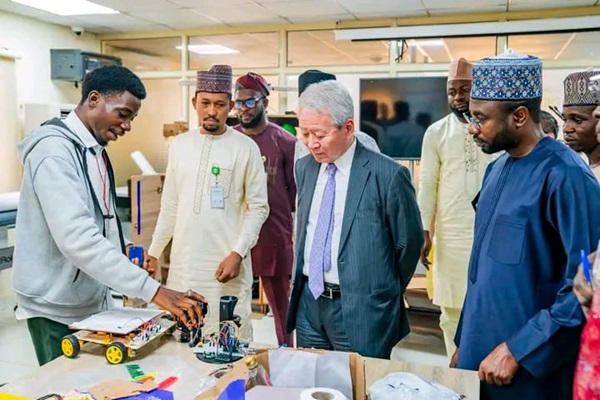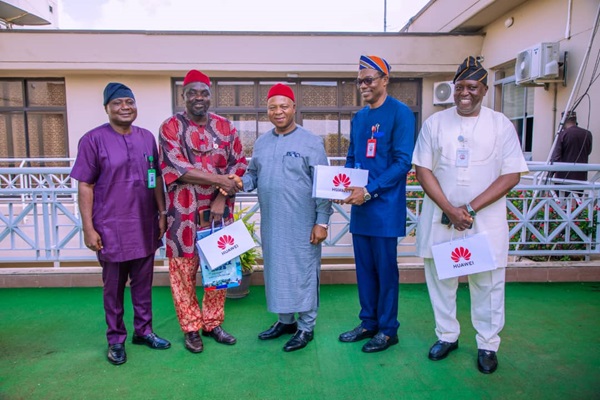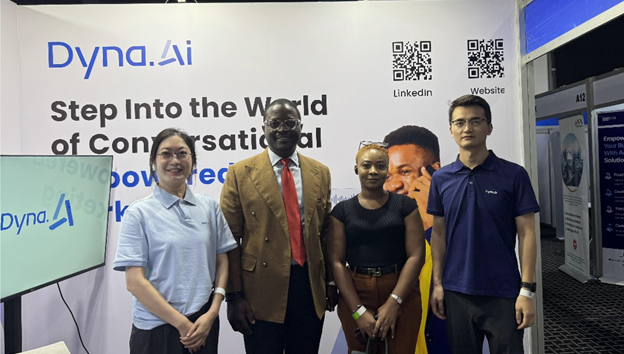Place your adverts here on InfoDig @ low rates; banner ads, sponsored links and guest articles etc. Contact us
 R-L: The director-general, National Information Technology Development Agency, Mallam Kashifu Abdullahi; President, Japan International Corporation Agency, Akihiko Tanaka inspecting one of the facilities at the National Center for Artificial Intelligence and Robotics during the visit to centre in Abuja.
R-L: The director-general, National Information Technology Development Agency, Mallam Kashifu Abdullahi; President, Japan International Corporation Agency, Akihiko Tanaka inspecting one of the facilities at the National Center for Artificial Intelligence and Robotics during the visit to centre in Abuja.The director-general of the National Information Technology Development Agency (NITDA), Mallam Kashifu Andullahi has revealed that the agency’s collaboration with the Japan International Cooperation Agency (JICA) has significantly elevated Nigeria’s startup ecosystem onto the global stage.
This statement was made during a meeting with JICA president, Dr. Akihiko Tanaka at the National Centre for Artificial Intelligence and Robotics (NCAIR) in Abuja, a special purpose vehicle office established by NITDA.
Abdullahi highlighted the fruitful impact of the partnership, stating, “Through this collaboration, we have sponsored Nigerian startups to participate in tech exhibitions and conferences across Africa and the Middle East. Additionally, we’ve connected them with Japanese corporations, such as Mitsubishi, resulting in training for 112 startup founders from 56 companies and the creation of over 300 direct jobs in Nigeria.”
Established in 2001, NITDA’s mandate is to implement the national IT policy. At its inception, less than 500,000 Nigerians had access to computers, but significant progress has been made in bridging the digital divide. Today, the ICT sector in Nigeria has grown from less than 0.5 per cent to over 16 per cent of GDP, with 120 million citizens now having computer access. This remarkable development underscores the agency’s commitment to enhancing technological literacy and capabilities within the nation.
Abdullahi referred to World Bank research predicting a global talent deficit of 85 million by 2030, which could result in an annual value loss of $8.5 trillion. He proposed that to address this looming gap, “A strategic talent pipeline between Nigeria and Japan can leverage Nigeria’s youthful population to tackle Japan’s aging workforce challenges, creating a symbiotic partnership.”
The director-general outlined NITDA’s Strategic Roadmap and Action Plan (SRAP 2.0), which includes eight key pillars aimed at driving Nigeria’s digital transformation. He emphasised that fostering digital literacy is essential for developing a skilled workforce, while building a robust technology research ecosystem will encourage innovation and research and development in emerging technologies.
Furthermore, Abdullahi stated, “The agency plans to strengthen policy implementation and legal frameworks, promote inclusive access to digital infrastructure and services, enhance cybersecurity and nurture an innovative entrepreneurial ecosystem.” He added that NITDA will focus on internal transformations to become more agile, creating a psychologically safe environment for all stakeholders to contribute actively.
In his remarks, Tanaka praised NITDA’s dedication, noting that partnering with NITDA was a prudent decision given its crucial role in global development. He highlighted co-creation as JICA’s guiding principle, emphasising that this approach aligns with JICA’s mission to collaborate with organisations like NITDA to drive growth and address global challenges.
“Co-creation is the overarching principle guiding our activities, especially in harnessing information technology to drive sustainable development,” he asserted. He also recognised Nigeria’s proactive efforts in advancing information technology and artificial intelligence, affirming JICA’s commitment to collaborating on these initiatives.
By leveraging the strategic application of these technologies, Nigeria can expect a surge in startup creation among young entrepreneurs. Tanaka advocated for harnessing the creative potential of young engineers, scientists and entrepreneurs to develop innovative solutions that enhance societal well-being, positioning Nigeria as a burgeoning tech hub in the global market.








)






 English (US) ·
English (US) ·